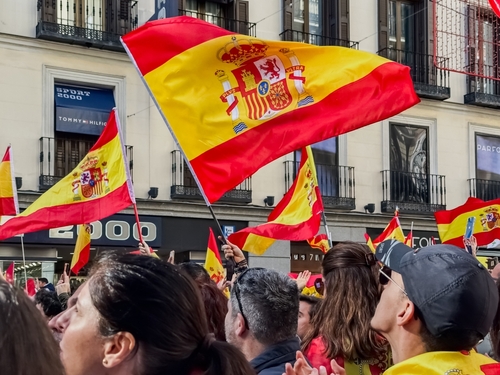
Sánchez is the only left-wing leader in Europe not to lose.
In the recent European elections, the political Right gained strength in most countries, except in nations facing critical situations where it’s hard to differentiate between the Right and the Left. However, the “Spanish case” stands out as the only one where the center-left continues to maintain enough support to avoid a legitimacy crisis.
Let’s go back to the 2023 general elections: Many people had anticipated a victory for the Partido Popular (PPE), especially after the center-left bloc suffered significant losses in the recent local elections. However, despite an improvement of more than 10 percentage points compared to the 2019 elections, the PP only garnered 33% of the votes, while Pedro Sánchez’s PSOE (S&D) nearly matched it with almost 32%.
The need to reach 176 seats to govern Spain has therefore inevitably led to the evaluation of post-election alliances. The PP spoke with Vox (ECR) stopping at 170 seats without prejudice to the desire of the nationalist wings of the two parties not to ally themselves with any independent or separatist formation; the PSOE instead first received the approval of Sumar (GUE/NGL) and then of various regionalist formations that give external support to the government, including the Republican Left of Catalonia (ERC, Greens/ALE), the Junts per Catalunya list ( NI), the Basque formations EH Bildu (GUE/NGL) and the Basque Nationalist Party (EAJ/PNV, RE) and the parties of Galician interest (BNG, Greens/ALE) and Canary Islands (CC, pro-RE).
Sánchez thus counts on 147 direct votes plus 32 external support, which brings him to 179 against the 171 of the center-right PP-Vox bloc. A weak majority, but which still allows him to remain in government of the country.
The 2023 regional elections saw the Spanish Right triumph in Aragon, the Canary Islands, Cantabria, the Valencian Community, Extremadura, the Balearic Islands, the Community of Madrid, Murcia, La Rioja, Ceuta and Melilla. Of these, 8 regions were “wrested” from the center-left majority that governed them.
The 2024 session of the administrative and European elections thus seemed like the only possibility to give the definitive push to Spanish socialism, but this was not the case. In Catalonia, a region that is certainly very difficult for the People’s Party, the Socialists proved to be the first party with 28% of the votes, leading both Puigdemont’s formation at 22% and the ERC at 14%, with the People’s Party at 11%. and Vox at 8%. Certainly, the situation is still incandescent, if you consider that the socialists have “lost” the first race for the election of the President of the Catalan Parliament, won by Puigdemont’s supporters with 59 votes out of 135 with the decisive absence of the center-right and the left of Sumar. Junts, ERC, and CUP (the “triad” of the Catalan independence movement) stop at 9 seats from the absolute majority, a pact between the socialists, the ERC, and Sumar seems more likely, but it is still premature.
It didn’t go any better in the Basque Country: the PNV and EH Bildu were tied (35% for the former, 32% for the latter, tied with 27 seats), followed by the socialists with 14% and 12 seats, the popular ones with 9% and 7 seats. Sumar and Vox close the Basque parliament with 1 seat each. The outgoing coalition saw the PNV and the socialists united, with 41 seats against the opposition’s 33. Most likely, the same alliance that should gain a majority with 39 seats out of 75 will emerge again, thus leading Sánchez to claim another victory.
The only region in which the People’s Party triumphed was Galicia, a historically right-wing region, where with 47% they took home the absolute majority of seats. Curiously, it is the only region of the three 2024 elections where Vox failed to win even one seat with 2%.
The final result of the European elections therefore does not seem absurd: the PP stops at 34% with 22 seats, the PSOE at 30% with 20, Vox at 10% with 6, Sumar-Podemos at 8%, and 5 seats. Then followed by some regionalist formations (ERC-EH Bildu-BNG-Ara Més) with 5% and 3 seats, the “party” born on the initiative of a web star, Alvise Pérez, close to the far right and called “Se Acabó the Fiesta” (NI) at 4.5% with 3 seats and Junts closes (2.5% and 1 seat) and the PNV, in coalition with other moderate regionalist parties, at less than 2% with one seat.
Projecting the results, we see how the center-right stops at 44% with 28 seats out of the 61 available, the center-left at 47% with 30 seats, and the “tipping point” would be Pérez’s party with that 4, 5% decisive.
This being the case, two elements are clear: Sánchez and the separatist left coalition have not weakened over time, so much so that they never drop below 45%; on the right, the presence of two groups in opposition to each other for the more nationalist and Eurosceptic electorate does not strengthen the Partido Popular enough to give the decisive impetus to win. Very important issues will necessarily have to be developed if Mediterranean Europe is to be “reunited”.



 Subscribe
Subscribe